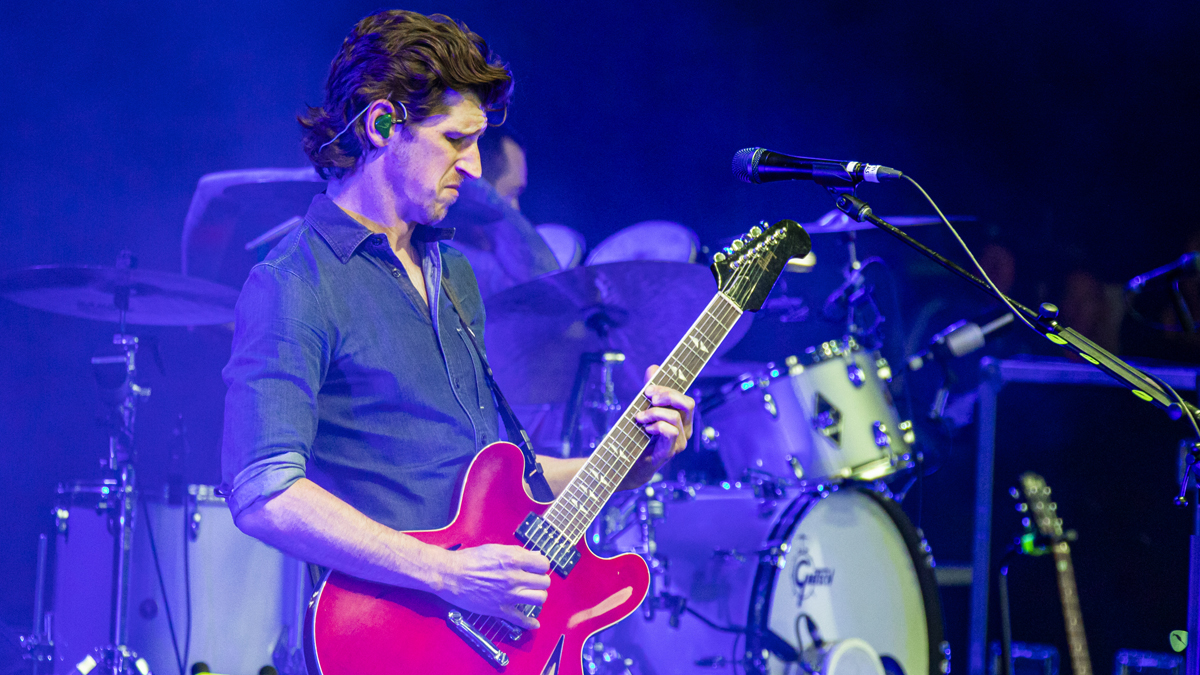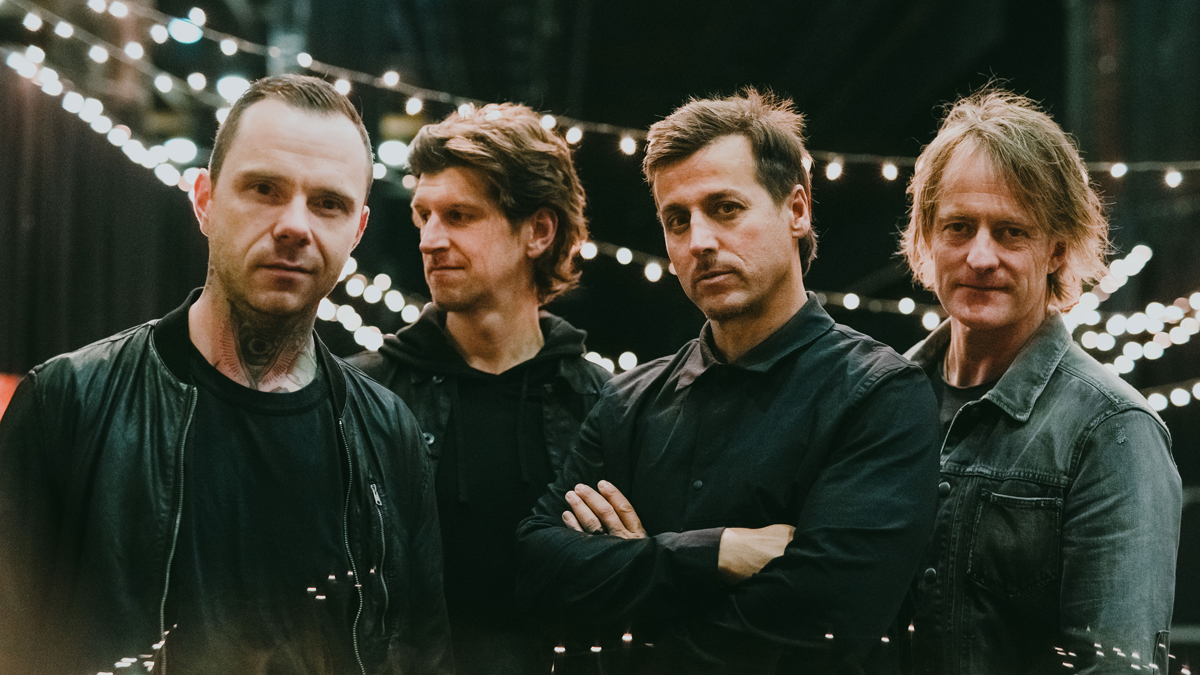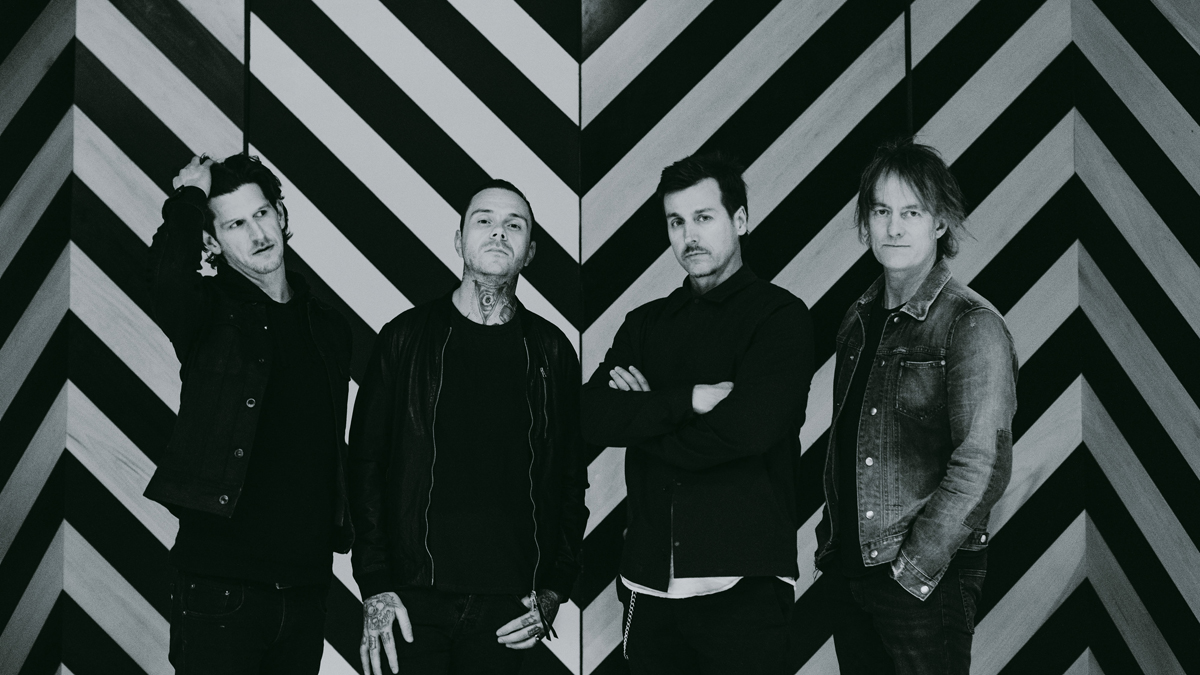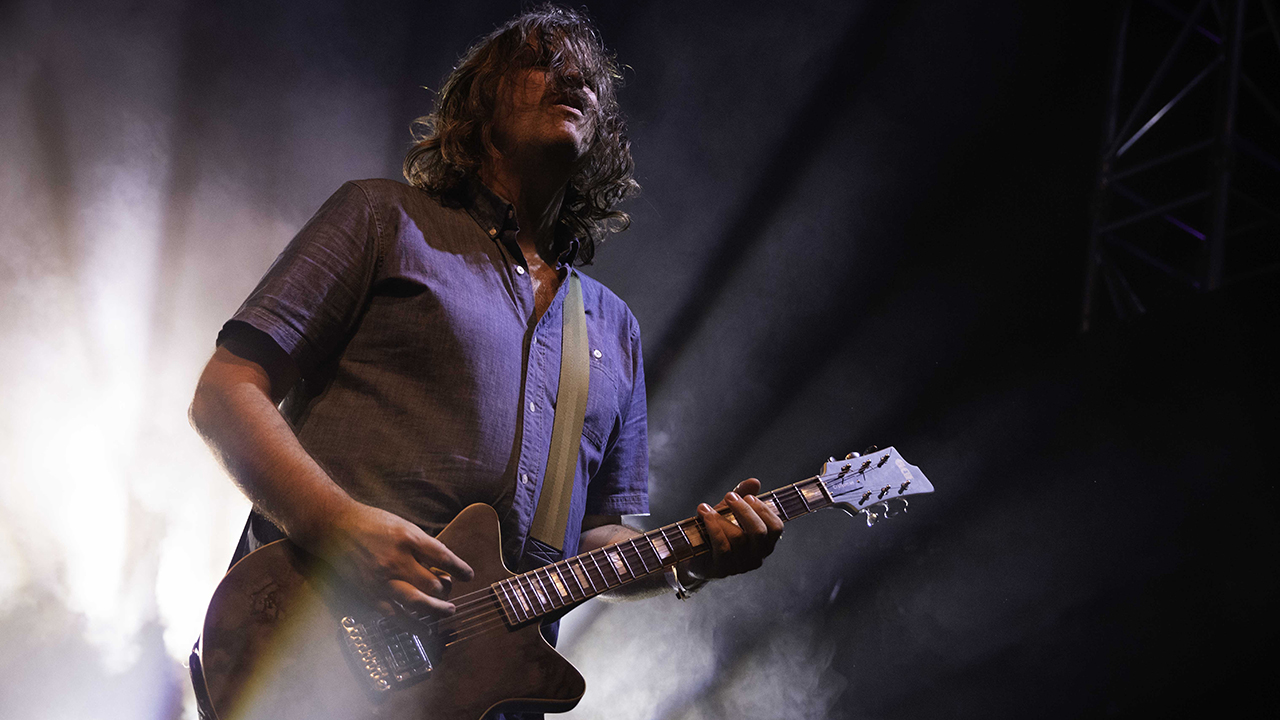Our Lady Peace's Steve Mazur: "The guitar compels people because of its physical nature. It's the closest instrument to the human voice"
Mazur dissects the power of the guitar, his newfound adoration for the Kemper Profiler and the sonic forces behind the Canadian alt-rockers' latest effort, Spiritual Machines II, which arrives two decades after the first

All the latest guitar news, interviews, lessons, reviews, deals and more, direct to your inbox!
You are now subscribed
Your newsletter sign-up was successful
On Friday (January 28), Toronto, Ontario-born alt-rockers Our Lady Peace released Spiritual Machines II, the follow-up to the group’s 2000 release, Spiritual Machines. Produced by TV on the Radio’s Dave Sitek, the album is bright and sharp. Like its predecessor, the record also features “predictions” from inventor Ray Kurzweil, who muses on the concept of technology and its impact on humanity’s future.
Releasing a follow-up album some 22 years after the original takes guts. But Our Lady Peace, which began formally in 1992, passes any test with funky aplomb. And while Spiritual Machines offered 147 predictions to its listener (86 percent of which came true, the band says), the new album offers both thoughtful ideas and music to get your heels shimmying.
We caught up with the band’s lead guitarist, Steve Mazur, who took over in 2002 for Our Lady Peace’s original six-string player, Mike Turner – who was also brought back into the fold for Spiritual Machines II, since he’d had such an important role on the original LP in 2000.
We asked Mazur about the band’s approach to using the guitar on the new record, what gear he took advantage of in recording sessions and what he loves most about his chosen instrument.
Our Lady Peace has evolved a great deal since the band began in 1992. One of the biggest changes is how the band uses the guitar. Spiritual Machines was more in the vein of punk or art-rock, but its sequel is more funk-infused. What’s most impacted your choice to evolve your sound over the years, specifically from a guitar point of view?
"Well, I think it’s interesting. A lot of bands over the past 40 years started out more guitar-centric then began to move away from guitar as the principal harmonic vehicle of their music. Radiohead and Siouxsie and the Banshees are two examples of this. I think the reason for this is maybe twofold: the fact that the guitar is a wonderful, incredibly expressive and versatile instrument, and also the fact that guitar is often the tool at hand when you are starting out.
"That’s not to downplay its inherent greatness as an instrument. As an artist, you constantly seek out new forces to inspire and excite you, and in turn you grow from that search. This usually entails some degree of jumping off from the known into the unknown. The unknown can be scary, but also as we all know, exciting. So, for myself and for Our Lady Peace, searching out new sources of inspiration led us to experiment with different ways to approach how we use the guitar.
All the latest guitar news, interviews, lessons, reviews, deals and more, direct to your inbox!
The guitar is a wonderful tool, but at the end of the day the tool has to serve the music, not the other way around
"You listen to a new artist or style, which encourages you to maybe learn a new chord or lick, or get a new pedal or device. You mess around with those devices, and all of a sudden you write something with it or bring it to the next recording or writing session, throw it on and all of a sudden a new color comes into the fold.
"So a gradual process of incorporating those instances has led us to a gradual change of how we use guitar in the band today. It’s all music. Guitar is a wonderful tool, but at the end of the day the tool has to serve the music, not the other way around. That might sound pretentious – I hope not [Laughs]."

How did you attack your guitar parts on the new album?
"This album was very collaborative between the band and the album’s two producers, Dave Sitek and Jason Lader. This was brought on largely by the Covid-19 pandemic. As we are an international band – Raine [Maida, vocalist] and I are in California, while Jason [Pierce, drummer] and Duncan [Coutts, bassist] are in Toronto – we couldn’t physically be together while making a good portion of the record. So there was a lot of online sending around of files.
"But we also wanted to push things a little further than usual, so we let Dave and Jason have more hands-on creative license with the songs than we’ve had producers do in the past. Because we were all separated, this led to both producers playing various instruments, including guitar, on the songs in order to see their vision through. Again, this was some unfamiliar and uneasy ground at first, but sometimes you need to get out of your comfort area to grow.
"A lot of times I was adding guitar to what they had laid down as foundations. This was interesting, because instead of adding guitar tracks on top of other guitar tracks that I had already played, as in the past with overdubbing, this time I got to intertwine my feel and style with theirs. The songs Stop Making Stupid People Famous and Future Disease are good examples of this.
"I love the juxtaposition of our different guitar feels and approaches on those two tracks. Again, this approach was different for us compared to the last few albums, but sometimes you just have to change it up!"
What did Mike Turner – who came back to help work on Spiritual Machines II after a two-decade hiatus – bring to the process?
"Mike was a force behind the concept and music of the original Spiritual Machines album, so we really wanted him to be involved on this sequel. Unfortunately, because of the pandemic, we weren’t able to get together in person to collaborate, so instead we asked Mike if he would contribute a track that we could use for one of the interludes, where Ray Kurzweil speaks. He liked the idea, so we sent him the soundbite of Ray and he took it from there and provided a great track. We’re very glad that his mark is on this album. It feels complete having his involvement. And his is the track credited as 'ft. EMTEE.'”
What gear did the band take advantage of on the new album?
"Well, I was in between moving my studio space when we started making the record, so I was just set up at my residence where I couldn’t turn up an amp! So, there are literally some moments – the Future Disease fuzzy lead parts and the 19 Days solo, I believe – that are a Boss FZ-3 Fuzz plugged straight into Pro Tools. Soon though, upon the urging of Dave Sitek and others, I caved in and got a Kemper Profiler amp.
"I was reluctant at first, but I have to say I warmed up to it pretty quickly. My parts on the rest of the record were the Kemper with various stompboxes before it, and I believe all of Dave’s parts were a Kemper as well. Hats off to the Kemper folks, they’ve made a good product. I’m even using them live now. As far as guitars go, it’s my '70s Fender Starcaster doing the licks and stuff on Stop Making Stupid People Famous, and a Gibson Les Paul Standard on the fuzzy leads of Future Disease, 19 Days, and Run.
"I used Raine’s Fender Relic Telecaster on the opening and main lick of Good Die Young, and my old '67 Tele on the choruses of Simulation. Oh, and that’s a good old Z.Vex Fuzz Factory on the solo at the end of The Message. I love how that pedal oscillates and screams sometimes."
How have your own guitar tastes changed over the years?
"I’m much more into tone, sound and feel now than when I was younger. Some of that came from working with Bob Rock on the band’s previous records Gravity and Healthy in Paranoid Times. I was able to see the value and beauty in certain other aspects of guitar from working with him, and from working with Jason Lader.
"When I was young, I didn’t understand the greatness of players such as Keith Richards or Malcolm Young. Now something like Keith’s guitar track on Gimme Shelter gives me chills and a lot of smiles when I try to play it. I’m also more into sonic-color kind of players, like John McGeoch’s work in Siouxsie and The Banshees for example, or Johnny Marr with The Smiths. Also the Talking Heads and Tom Waits have been big influences."

Does this new album take from any new guitar influences that the original didn’t?
The band has evolved to see guitar as another sonic element and not necessarily the sonic foundation of each recording
"Well, I wasn’t there when the original Spiritual Machines album was made, so I can’t comment on what the guitar influences were there exactly. But I know the band’s general mindset towards guitar from the following album, Gravity, forward so I can comment on that. I’d say the band has evolved to see guitar as another sonic element and not necessarily the sonic foundation of each song and recording.
"That has freed us up to use guitar in various other ways, which is a great feeling. To be able to paint over things instead of having to hold down the fort all the time, so to speak. I think a lot of the players I have discovered in the past 20 years have found their way into our sound and thus, this album. I’ve always been a big John Frusciante fan, and I think the simplicity and starkness of some of his playing is present with us.
"I’d say the influence of players like John McGeoch and Johnny Marr have brought another dimension sonically to the guitar in our music. I also became a fan of electronic artists such as Kraftwerk and Depeche Mode, and I think bringing some of their melodic/sonic approach to guitar has added a new element to my playing on Spiritual Machines II as well as the few albums before it."
How did Dave or Jason specifically impact the way you thought about the guitar on the new record?
"Both are such inspiring people to work with. Jason, who we’ve worked with before on the Curve and Somethingness records, is fearless, which is great to be around. He’ll try anything, which helps me break down the barriers in my own mind about what is or isn’t okay to try. Dave’s approach was so out of left-field at times for us that it caused me to hear what I was playing in a different way.
"A lot of times I wasn’t playing over traditional rock drums, bass and guitar, so the guitar instantly feels and sounds different in your hands. I found my playing going to some surprising places over the things that both Dave and Jason did."
A major part of the album, and the original, is the commentary from inventor Ray Kurzweil, who talks about the potential impact of technology and machines on humanity. Did what he has to say impact how you thought about your relationship with the electric guitar?
"It did. Ray is a fascinating human being. The guitar to me is an interesting part of the discussion of the potential impact of technology, on music at least. I say this because on one hand it is a very traditional and guttural instrument, but nowadays we have the ability to plug it into devices that are on the cutting edge of technology and alter its sound in myriad ways, while still playing it in basically the same manner as people have done for a long time.
"I think the guitar is a very 'human' instrument, in that something about it really resonates with us. I believe that no matter what level technology gets to in regards to the electric guitar, people will still desire at times to play it in roughly the same way it is played now. There’s a connection there, the way there is a connection in going to experience live music in person.
For a long time still to come, people will want that feeling of what it feels like to play a guitar in your hands
"I think for a long time still to come, people will want that feeling of what it feels like to play a guitar in your hands. It’s a direct connection to vibration and the raw organic stuff of making music. So those thoughts were interesting to me while making Spiritual Machines II."
What do you love most about music and particularly guitar music?
"I love that it’s all in there with music. At least from my limited knowledge and experience of the forces of nature, it seems that all of them are present in it. And the more you dig into it, the more this seems to be true. As for how it relates to us humans – for some who have more math and logic-oriented minds, there is music that appeals to them. For others who are more 'feel' type of minds, there is music that moves them. And for people and minds everywhere in between, there is a music that moves them.
"I do admit to having an inclination towards the guitar in music. I just love the sound of guitar. Pretty much every kind. Sometimes just the sound of a good guitar is so right. The way it can sound on an AC/DC, Radiohead, Lynyrd Skynyrd, Talking Heads, Aerosmith or Stones record can just instantly get me going. You put up a good guitar on the left and another on the right – I don’t know if that will ever get old to me. Magic. Some things just work, and the guitar is one of them.
"I have an opinion that may be ignorant but I find interesting – that perhaps guitar compels people so much because of its physical nature. Your hands are literally directly on the sound source. You are pressing your flesh directly onto single strings. Compared to a piano let’s say, where your flesh presses down on a key, which triggers a hammer, which then strikes the strings.
"I have a feeling this is why the guitar can be such a personal and expressive instrument, and why it resonates and speaks to people so much. It may be one of the closest instruments to the human voice. Not to discredit, disrespect or discount a piano or any other musical instrument – every one of them has the ability to move people to rapture or tears, and we need them all! But maybe we guitar players actually have it easier than other musicians and therefore should count our blessings."
- Spiritual Machines II is available now.



